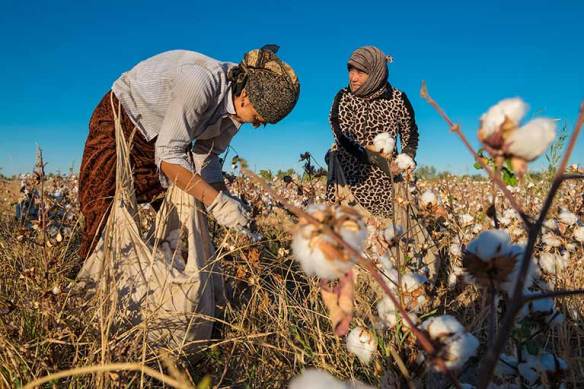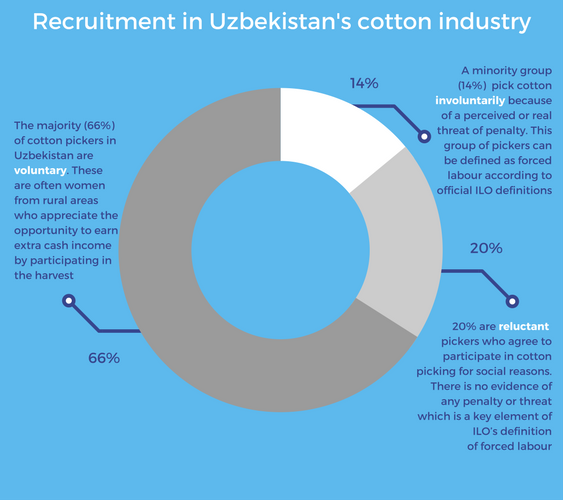
Beate Andrees,
Chief of the Fundamental Principles and Rights at Work Branch
Nearly a quarter of the adult population in Uzbekistan—over three million people—take part in the country’s cotton harvest each year. Some two thirds of them are women.
The ILO has been monitoring the cotton harvest for child labour since 2013. In 2015, it began monitoring the harvest for forced labour and child labour as part of an agreement with the World Bank.
During this period, it’s generally recognised that the systematic use of child labour in the harvest has been abolished.
And while forced labour of adults still persists, we’re seeing some very encouraging progress towards ending that as well. Just last week, in fact, Uzbekistan President Shavkat Mirziyoyev spoke before the United Nations General Assembly in New York where he pledged to end forced labour in his country and underscored his government’s engagement with the ILO.
Shortly thereafter, the Uzbek government announced that it would call back all students and civil servants presently at work in the cotton fields–a major step towards ending forced labour in that critical sector of its economy.
The ILO continues to play an important role to that end through its Third-Party Monitoring Project (TPM), which encompasses a wide range of different activities that take place across the country.
Here, in short, is how the ILO’s TPM project helps to promote jobs and protect people in Uzbekistan.

Around one in four adults in Uzbekistan is involved with the annual cotton harvest, which takes place between September and November. Copyright: DOZIER Marc / hemis.fr / Hemis
We engage decision makers at the highest level
Uzbekistan has ratified all eight ILO core conventions and incorporated them into its national laws. That includes making a formal commitment to ending forced labour. The ILO’s tripartite makeup as an organization representing governments, employers and workers—in addition to its long experience tackling forced labour around the globe—make it uniquely well positioned to help transform those commitments into action. But that can’t happen without engaging policy makers at the highest levels of government, which ILO and the World Bank do in close coordination.
We train people directly involved with recruiting cotton pickers
During July and August 2017, the ILO TPM project trained over 6,300 people involved with the recruitment of cotton pickers. This interactive training provided participants with key tools to reduce risks of child and forced labour during the recruitment phase. It was delivered directly by international ILO experts and reached every province and district in the country.
We independently monitor the effectiveness of recruitment systems
ILO experts conduct monitoring of labour conditions in the cotton harvest from September to November every year. Based on transparent methodology (see link to report below), the experts visit cotton farms as well as government offices, educational and healthcare facilities all across Uzbekistan. Experts are accompanied by a trade union representative, however the visits are unannounced and experts are unrestricted in deciding whom they want to interview and when.
Every year we conduct 3,000 such interviews of farmers, cotton pickers and government officials. The purpose of this monitoring is to examine recruitment systems, identify root causes of labour abuses and develop recommendations for continuous improvement. The findings of our most recent survey are available in the latest TPM report.
We survey the recruitment experience of cotton pickers
In addition to on-site monitoring activities, we also survey the recruitment experiences of individual cotton pickers through a series of focus groups which include over 2,000 participants. In addition to that, we conduct surveys of around 3,500 households consisting of confidential and anonymous face-to-face interviews. These surveys allow us to better understand the experiences of people involved with the cotton harvest and provide scientifically accurate estimates of the prevalence of forced labour.

During the harvest period, the ILO TPM Project team in Tashkent meets regularly with local civil society representatives in order to get their perspective on matters related to child labour and forced labour. We value their contributions and recognize the important role they play. We encourage civil society activists to submit well documented cases to the feedback mechanism and keep the ILO TPM project informed so we can monitor the case and include it in our annual TPM report.
We raise awareness of labour rights
In cooperation with local partners, the ILO conducts an annual comprehensive awareness raising campaign in Uzbekistan to ensure that all citizens are aware of their labour rights.
The 2017 campaign includes strategic distribution of 100,000 brochures and 44,500 posters to educational and healthcare facilities. The campaign features over 400 roadside banners along all of the country’s major highways. We also send out over 3 million SMS messages and air informative TV and radio commercials on all major networks.
It’s an effective way to get key messages about labour rights across to a large number of people that are involved in the cotton harvest.
We strengthen feedback mechanisms
We believe that grievances are best addressed through effective social dialogue at the local level. We work actively with relevant organizations to develop, improve and promote feedback mechanisms such as telephone and email hotlines that people can use to ask questions or raise concerns.
In 2017, we began using social media to specifically target young people including students. An interactive bot service for the popular app “Telegram” is available through the handle @kasaba_bot to provide FAQs and an opportunity to interact with the feedback mechanism. The bot provides answers to key questions on recruitment, compensation and working conditions. The Federation of Trade Unions of Uzbekistan (FTUU) Feedback Mechanism currently handles thousands of cases received from the public.
We publish our findings and recommendations
The ILO publishes all of its reports and findings directly on the ILO website. We are transparent about the methodology we use for our monitoring and surveying of the harvest. More details can be found in our latest TPM report.
We support wider agricultural and labour market reforms
The ILO, together with the World Bank and other international organizations, provides advice and support to help Uzbekistan reform its agricultural sector and the wider labour market. It is important to recognize the significant progress already achieved in this area, such as the government’s commitment to reduce cotton production by 20 per cent till 2020.
This year we have already seen a 5 per cent reduction and a further 10 per cent reduction is planned for 2018. This kind of reform has a positive impact on reducing forced labour as more remote fields at higher risk of forced labour will no longer be used for growing cotton.
The ILO TPM Project is made possible by a Multi-Donor Trust Fund established by the World Bank with support from the European Union, United States and Switzerland to finance activities to build capacity of state and non-state institutions to address sustainability of cotton production and support the elimination of child and forced labor in the cotton sector.
